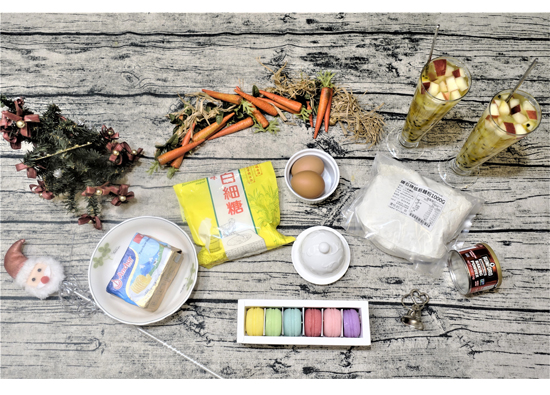12.2020 Life Guide
Nourishing tonic in autumn and winter. Be careful of taking too much and hurt the body.
Nutritionist of Far Eastern Memorial Hospital /


Although there is a folk saying: "tonic in autumn and winter, fight tiger in the coming year", but do you know? As a matter of fact, many patients are sent to see doctors every year for acute and chronic diseases. In this issue, let the nutritionist of Far Eastern Memorial Hospital tell you what small details should be paid attention to in order to supplement your body and really help your health score!
Common pitfalls of tonic
The weather is getting colder. At this time, if we can warm ourselves up with a bowl of hot soup, our happiness will be doubled instantly. No matter the tonic soup, hot pot, spicy pot or sweet purple rice porridge, black sugar ginger tea, longan and red jujube tea, they are good partners to accompany us through the winter. However, these foods often contain too much oil or refined sugar, and when enjoying the delicious food, the weight may be out of control. It is suggested that people should choose low-fat meat products, replace processed food with fresh vegetables, reduce oil intake, and remove the oil slick before drinking soup to avoid drinking too much fat. When enjoying desserts, you should also pay attention to the portion size, or replace the sweet drink with sugar free tea, so as to avoid excessive refined sugar intake.
In addition to the risk of weight loss, it is also a big risk for people with chronic diseases. The following will be specific to different diseases, to show you what should pay attention to.
[chronic kidney disease] moderate protein restriction and keeping away from traditional Chinese medicine stewed tonic soup
Ginger duck, sesame oil chicken, mutton stove, etc. are common stews for winter tonic. Some people also add some traditional Chinese medicine to cook. However, these "tonics" actually have a potential crisis for patients with chronic kidney disease.
The kidney function of patients with chronic kidney disease has been damaged. In daily diet, the intake of protein (beans, fish, eggs, meat) must be appropriately limited to reduce the generation of metabolic waste. Therefore, when taking tonic supplements, we should still follow the daily protein intake, and do not eat too much, which will aggravate the renal function damage.
In addition, the kidney is also an important organ to balance the body's sodium, potassium, phosphorus and other minerals. Even if "only drink soup and don't eat meat", it may lead to excessive mineral intake and increase the burden of kidney metabolism. In particular, stews with Chinese herbal medicines may affect heart function due to excessive intake of "potassium". Therefore, such patients should avoid eating Use all kinds of tonic soup.
[hypertension, hyperlipidemia] pay attention to oil and sodium intake
The soup used for tonic in winter usually contains too much "fat". If you eat too much, it may aggravate the abnormal blood fat of patients with hyperlipidemia and damage the cardiovascular health. Therefore, patients with hypertension and hyperlipidemia should pay special attention to the intake of fat. It is suggested that low-fat meat should be selected to replace the meat with high fat content such as streaky pork and three-layer meat. If chicken and duck meat are used, the skin can be removed before cooking. At the same time, it is suggested to reduce the oil consumption in cooking to reduce the oil content of the whole soup.
In order to achieve the effect of warm and hot body, many tonic soup will be added with "wine". However, excessive alcohol intake may lead to blood pressure rise and increase the risk of stroke in patients with hypertension! It is suggested that when cooking, use fresh vegetables to increase flavor and avoid alcohol flavoring.
Even if the fat and alcohol in tonic soup are reduced, excessive mineral "sodium" in stew is still a risk that can not be ignored. In addition to being unsuitable for patients with chronic kidney disease, it is also easy to make hypertension patients lose control of their blood pressure. Excessive consumption should be avoided.
[diabetes] balanced diet and proper carbohydrate intake
The patients with diabetes need to control the intake of carbohydrate food in particular. It is suggested that fresh vegetables should be replaced with some whole grain miscellaneous foods (such as yam, chestnut, taro). Besides reducing the amount of carbohydrate intake, enough dietary fiber can also help the blood sugar stability. In addition, noodles and winter flour, which are often used to match soup, are also "whole grains" foods that need to be controlled by diabetic patients. Processed foods such as fish dumplings, crystal dumplings, gongwan and rice blood, etc., which are used to hide sugar and oil, are also recommended to reduce intake or replace with fresh vegetables.
Although the intake of protein food has little effect on blood glucose, it is still necessary to pay attention to the fact that the intake of protein food with high fat content or high oil tonic soup may lead to high blood glucose after meal. It is recommended to choose low-fat meat and avoid excessive consumption. If you want a cup of hot drink after dinner, you can replace black sugar ginger tea or longan red jujube tea with sugar free tea. You can also choose "sugar substitute" to replace refined sugar (such as black sugar and rock sugar) which are easy to affect blood sugar.
Finally, when people who are usually strong or suffering from chronic diseases enjoy autumn and winter food with their families, they should not forget to follow the two principles of "balanced diet" and "proper intake". If you feel confused about tonic and don't know how to choose food, it is recommended to consult a professional doctor or dietitian first, so as to keep fit and not hurt!




















